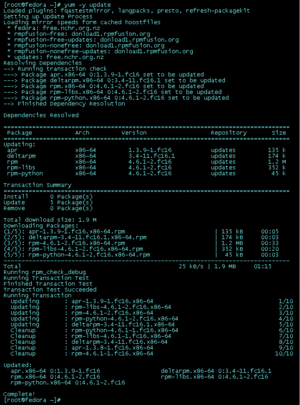Yellowdog Updater, Modified
 |
|

Yum running an update on Fedora 16
|
|
| Developer(s) | Seth Vidal |
|---|---|
| Repository | yum |
| Written in | Python |
| Operating system | Linux |
| Type | Package management system |
| License | GPL v2 |
| Website | yum |
The Yellowdog Updater, Modified (yum) is an open-source command-line package-management utility for computers running the Linux operating system using the RPM Package Manager. Though yum has a command-line interface, several other tools provide graphical user interfaces to yum functionality.
Yum allows automatic updates, package and dependency management, on RPM-based distributions. Like the Advanced Package Tool (APT) from Debian, yum works with software repositories (collections of packages), which can be accessed locally or over a network connection.
Under the hood, yum depends on RPM, which is a packaging standard for digital distribution of software, which automatically uses hashes and digisigs to verify the authorship and integrity of said software; unlike some app stores, which serve a similar function, neither yum nor RPM provide built-in support for proprietary restrictions on copying of packages by endusers. Yum is implemented as libraries in the Python programming language, with a small set of programs that provide a command-line interface. GUI-based wrappers such as Yum Extender (yumex) also exist. A rewrite of yum based on libsolv named DNF is currently being developed and replaced yum as the default package manager in Fedora 22.
As a full rewrite of its predecessor tool, Yellowdog Updater (YUP), yum evolved primarily in order to update and manage Red Hat Linux systems used at the Duke University Department of Physics. Seth Vidal and Michael Stenner did the original development of yum at Duke, while yup was originally developed and maintained by Dan Burcaw, Bryan Stillwell, Stephen Edie, and Troy Bengegerdes of Yellow Dog Linux. In 2003 Robert G. Brown at Duke published documentation. Subsequent adopters included Red Hat Enterprise Linux,Fedora, CentOS, and many other RPM-based Linux distributions, including Yellow Dog Linux itself, where it replaced the original YUP utility, which had its last update on SourceForge in 2001. By 2005, it was estimated to be available on over half of the Linux market, and by 2007 yum was considered "the tool of choice" for RPM-based Linux distributions.
...
Wikipedia
